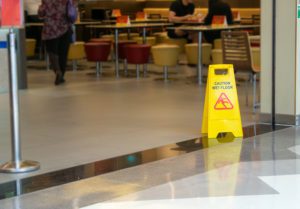A Primer on Slip and Fall Cases
In the legal realm, ‘slip and fall’ is terminology used by personal injury lawyers and insurance claims adjusters to describe accidents in which a person fell and hurt themselves at a business, commercial location, or otherwise private property. Usually, slip and fall cases are attributed to poor conditions on the property, and if it can be proven that the owner of the property was aware or should have known that these conditions existed – and did nothing about it – then the injured may be able to recover damages for their losses, such as medical expenses, lost wages, and more.
Understanding how slip and fall cases are navigated by attorneys, insurance companies, and courts alike will be essential if you wish to successfully file a lawsuit. Below, we outline some of the most important aspects of filing a slip and fall claim.
Statutory and Legal Standing for Slip and Fall Claims
In Florida, slip and fall cases were created to specifically address slip and fall personal injury and premises liability claims. Florida’s laws governing negligence in torts includes Chapter 768, which has a section providing for slip and fall cases. That law specifically states:
“If a person slips and falls on a transitory foreign substance in a business establishment, the injured person must prove that the business establishment had actual or constructive knowledge of the dangerous condition and should have taken action to remedy it.”
The law goes on to explain that in order to prove that the owner had constructive knowledge of the of the condition, it must be shown that:
- The condition existed for a long enough time that an ordinary person should have fixed it
- The condition occurred with regularity and therefore an accident was foreseeable
In order to prove that these conditions existed, both the plaintiff’s and defendant’s attorney will likely call on a series of witnesses or rely on surveillance footage that demonstrates that a dangerous condition was both present and continuous at a given location.
Pursuing the Right Theory
Earlier, we mentioned that Florida slip and fall cases will generally be pursued as either personal injury claims or premises liability claims. Determining which to pursue, however, can be the difference between a successful lawsuit and one that is rejected or overturned. While there are certainly some slip-and-fall accidents that would warrant seeking damages under both claims, it’s important to understand the difference between the two if you wish to recover damages for your medical expenses and other losses.
In a personal injury claim, a plaintiff need only prove that general negligence caused an accident to occur. In a premises liability claim, however, the burden of proof is a bit higher.
In Florida, slip and fall accidents will generally fall under premises liability claims that require a property owner or occupier to use ordinary care to reduce or eliminate an unreasonable risk of harm created by a condition on site. General negligence, on the other hand, is less stringent, because it eliminates the ‘should have known’ clause inherent to a premises liability claim. Instead, the owner is required only to have acted as any ordinary person would under the circumstances. Because Florida law specifically outlines slip and fall accidents as having to meet this burden of proof, it may be difficult to file a premises liability claim if your case fails to be able to establish this burden of proof. However, your attorney may be able to file a personal injury claim for your medical losses in the absence of such proof.
Contact a Slip and Fall Lawyer Today
If you’re a Florida resident that’s been involved in a slip and fall case, don’t hesitate to contact an attorney today. Your attorney will advise on the best course of action to ensure that you recover damages for your losses.
Notifications

PLease enter valid phone number
You’ve requested a call for
Verification Required with text message
Text verification only works in US & Canada.
Verification Required with email address
Verification Required A 6-digit code has been sent to
Too many attempts Please try again later



